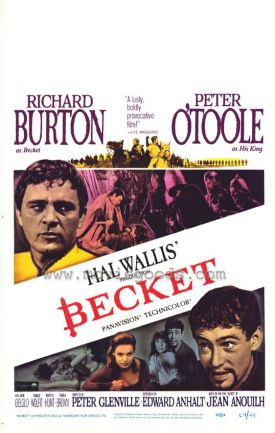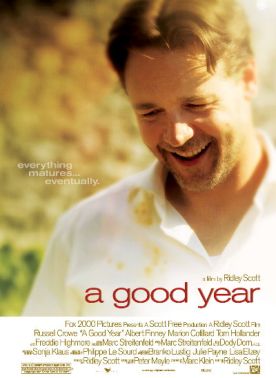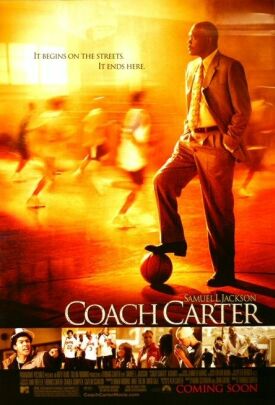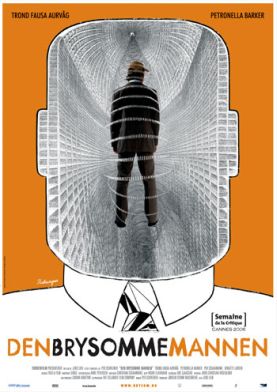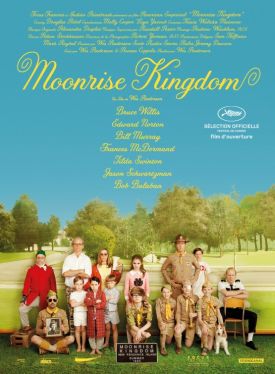Becket
The Film Forum’s revival of the film version of Jean Anouilh’s Becket, opening today, is to be welcomed not just for its own sake but as a window into an interesting period in the history of popular culture: the transition from the earnest — usually over-earnest — “problem” films that dominated the more serious sorts of popular movie-making between the end of World War II and the mid-1960s to the youth- and countercultural-oriented pictures that came after that. For Becket is very much a movie of its time — that is, 1964. Edward Anhalt’s adaptation of Anouilh (directed by Peter Glenville) retains a lot of the playwright’s sensibility, and particularly his conception of the murder in 1170 by agents of Henry II of Thomas Becket, Archbishop of Canterbury, in terms of the questions of morality and honor involved raised by the collaboration of a conquered people with their conquerors.
Though obviously an important subject for a Frenchman in the post-war years, this now appears slightly bizarre. To start with it is doubtful that Becket was, as Anouilh imagined him, a Saxon who first became the best friend of the Norman King Henry and then turned against him, or that the English clergy were all-Saxon while the nobility were all-Norman, like rival football teams. And without these assumptions the carefully built-up but rather strained self-hatred of the film’s Becket (Richard Burton) makes no sense. Also, its ideas of honor and duty are confused and confusing. And yet, at this distance of time, it comes as a shock that a movie should have concerned itself with such matters at all.
In Peter O’Toole’s portrayal of the king’s coarseness and stupidity there is also more than a hint, I think, of Harold Macmillan’s line about the British becoming the Greeks to the Rome of the new American empire. Henry remains charming because he knows his own limitations and always defers to his friend’s learning and intelligence, but we know that the king’s assertion of his power is always going to trump his attachment to culture — or friendship.
Like Mr O’Toole’s Lawrence of Arabia or Robert Bolt’s A Man for All Seasons, the film belongs to the genre of what Judith Crist described as “the ‘intellectual’ spectacular.” The quotation marks around “intellectual” are meant to suggest (I think) a certain falseness about these films’ intellectual pretensions, and the glibness with which they supplied a popular audience, hungry for “culture,” with potted versions of history. Inspired partly by the post-war rage for psycho-therapy, the intellectual spectacular derived a lot of its kick from the illusion that this or that historical figure had been “explained” in terms of what, a few years later, were to be described as his “hang-ups.” Oh, so that’s what the Reformation or the Renaissance — or whatever large historical phenomenon you like — was all about.
Now this fad survives chiefly among such bedraggled leftovers from the heroic liberationists of the 1960s as Norman Mailer who, having explained the psychology of Jesus Christ to his own satisfaction in The Gospel According to the Son (1997), this week comes out with the Mailerian explanation of Adolf Hitler in The Castle in the Forest. What a laugh!
Becket is also of its time in its portrayal of the boozing and whoring of its dos amigos as good clean fun and a charmingly humanizing trait for the saintly Thomas — though it is also careful to limit the latter’s visible contribution to the revels to the rescue of a peasant lass from the king’s lascivious appetites. At one point Henry apostrophizes his absent friend by saying of their drinking and wenching that “You were even better at that than I was.” You couldn’t prove it by anything we see of him in this film — which is, moreover, able to hold at bay its own homoerotic subtext in a way that no contemporary film would ever do, even if it could
Yet Becket also retains a certain dignity that transcends its period. Partly this is because of the unusually restrained performance of Burton in the title role. For some reason, before I saw the film again, I had remembered him as the king and Peter O’Toole as the saint — perhaps because of the latter’s saintly T.E. Lawrence two years before. But our memories of the drunken brawler and serial marry-er of a few years later act retrospectively to add a certain authenticity to his portrayal here of a man whose living for his appetites is only the product of spiritual disappointment approaching despair. It’s this idea of someone who reaches for martyrdom as a hopeful escape from the freedoms that the Hollywood of the last 40 years or so only knows how to worship that makes this a film to be cherished as well as a monument to its times.
Discover more from James Bowman
Subscribe to get the latest posts to your email.

